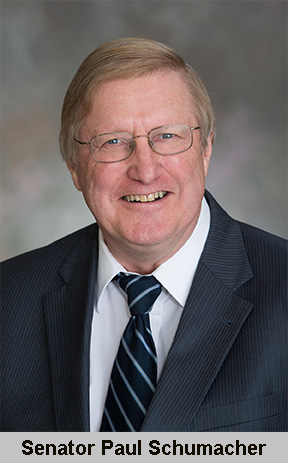 Editor’s Note: This is part of a series of blog posts by Nebraska’s term-limited senators reflecting on their time in the Nebraska Legislature. We thank them for their dedication and service to Nebraska. In this post, Senator Paul Schumacher looks back at his years representing District 22.
Editor’s Note: This is part of a series of blog posts by Nebraska’s term-limited senators reflecting on their time in the Nebraska Legislature. We thank them for their dedication and service to Nebraska. In this post, Senator Paul Schumacher looks back at his years representing District 22.
In some respects, service in the Legislature is rather like an encryption system where a key from the system combines with the key of the Senator to produce a unique message, subject to misinterpretation. The message I received was one of concern for the state. Things are the way they are because the wizards behind the curtain like “Oz” just the way it is. The state is underpowered and behind the power curve. It fundamentally lacks the will and critical mass to adapt. The past is too comfortable; the future is too foreboding; and, despite protestations to the contrary, the present is too profitable for those well to the right of the first sigma point on the right side of the income distribution curve.
Agricultural efficiencies are increasing at an accelerating rate largely as a result of corporate investment in the agricultural means of production. The result is the economic need for population in non-metro Nebraska is dramatically decreasing. The population of the vast majority of the rural communities peaked before 1930, before the dawn of the tractor. Efforts to reverse that trend through (1) a combination of lucrative tax incentives directed at incenting out-of-state capital to create manufacturing jobs on a par with those in developing countries, and (2) behavioral conditioning by “initiating age-appropriate career education as early as elementary school” coupled with STEM (Students To Enter Manufacturing) programs are hardly indicative of the adaptation and optimization necessary to bring a different future into being.
The metro area is largely dependant on a continuing supply of population migrating from the rural areas, a supply that is drying up. It heavily relies on the substantial deployment of state resources in it. Traditionally, that has been done through government and University spending, both of which are coming under increasing scrutiny as the performance of the University is questioned and the abhorrence to taxation increases. In totality, the metro faces a highly competitive challenge in the global competition of geography, climate and culture.
Over a decade ago at the Kennedy School of Government, the question was posed: “Why would an area with extremely abundant clean fresh water, unparalleled production of grain and livestock, transcontinental railroad mainlines, hundreds of miles of multilane highways, strategic location, core communication facilities, wide-open spaces and low population have difficulty attracting and maintaining population?” To the participants, many of whom were from very poor countries, the place sounded like paradise and its existence was questioned. Finally, one said, “If there is such a place, then there would only be one reason … a repressive government.” Those words haunted me throughout my time in the Legislature.
Were I pharaoh I would leverage the Denver growth plume and construct a state-of-the-art city at the I-76 & I-80 intersection; direct the University and our public power companies to invest heavily in nuclear energy focused on thorium fission, Low Energy Nuclear Reactions (LENR), and hot fusion; direct the University Law School to focus its energy on the art of capital formation and corporate organization; and start and an early age to have our children look upward on a dark clear night to behold our destiny. The probability of such a vision being brought into being is remote because the wizards behind the curtain like Oz just the way it is.
Paul Schumacher
www.voiceofnebraska.com


